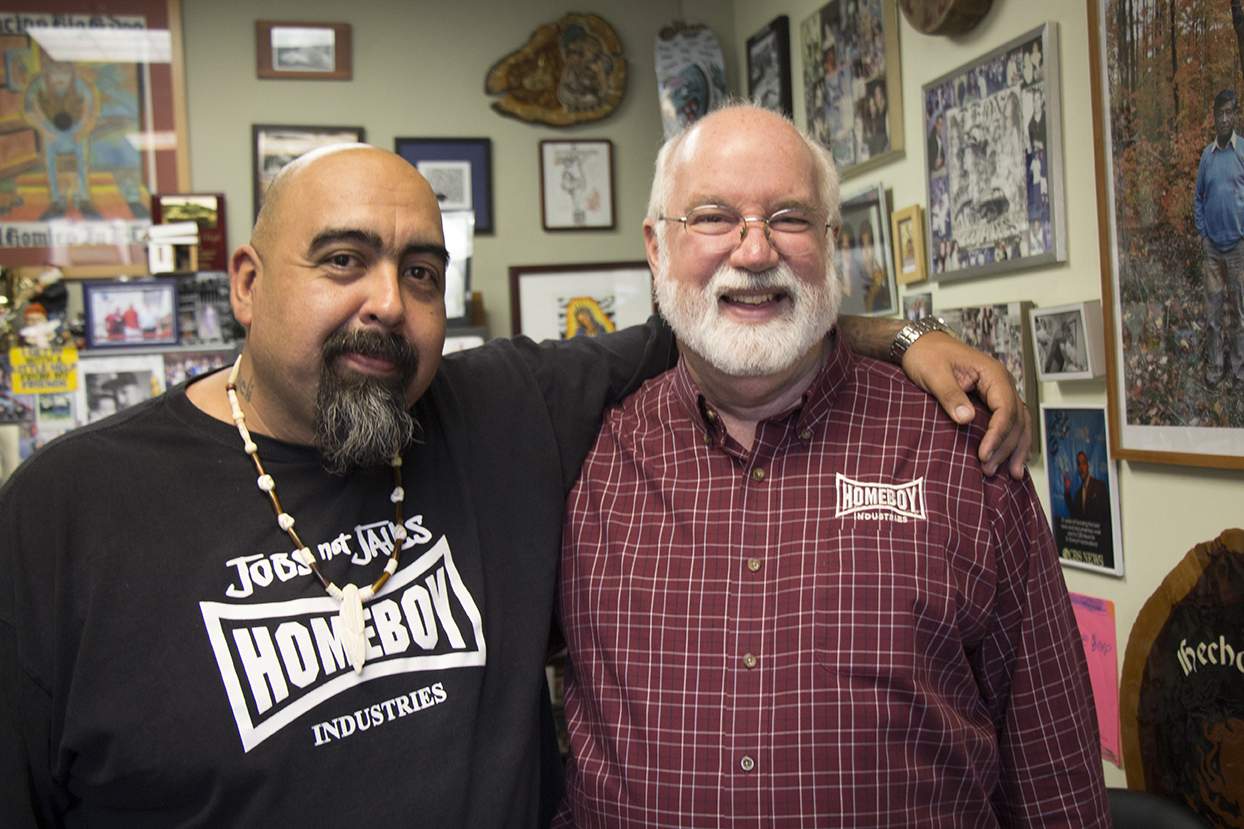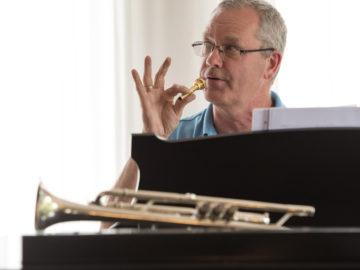
Jose Osuna, Director of External Affairs, and Homeboy Industries founder, Father Gregory Boyle
Homeboy Industries: The Tipping Point for Change
BY MELISSA WALKER
Leaving the network of a gang and the financial security is not easy, but finding a way to make a more a commonplace lifestyle can be even harder with the burdens of gang markings, a criminal record, and lack of education and employment history.
A Los Angeles nonprofit started by a Jesuit priest, Homeboy Industries provides this pathway to help former gang members rehabilitate by bringing a positive change to the lives of people of all ages with hope, support and training.
Founded in 1988, by Father Gregory Boyle, previously incarcerated gang members, both men and women, are provided with comprehensive free services and a new life path from the groups headquarters in the gang neutral territory of Chinatown.
“I came to Homeboy Industries a little over seven years ago, and I came for the same reason that brings many people here, I needed help,” Jose Osuna, Homeboy Industries Director of External Affairs told impactmania. “I was involved in the gang lifestyle for over 25 years of my life. When I finally decided to make a change, I had a friend that was already working here at this organization, and he told me that I should come and talk to Father Greg about a job. I had just got arrested for a drug offense, and it was real difficult for me to get back into the workforce.”
Changing Lives
Homeboy Industries comprehensive services are designed to provide over 10,000 community clients and trainees with an opportunity to turn their lives around to become more productive members of the community.
“My number one impact maker is so easy to answer – it’s Father Gregory Boyle,” Osuna exclaimed. “Here’s a man that has loved me unconditionally, extended a hand to me when nobody else would, and didn’t want anything in return for that, simply wanted to see me succeed and be the best Jose that I can be.”
Case managers help to provide a goal-oriented service plan with employment services providing a weekly series of workshops to break job barriers and find hidden markets – like the Photovoltaic Training Program that covers tuition and supply costs for clients wishing to enter the green industry. And, over 50 classes each week guide clients to a high school diploma.
Tattoo removal is also provided to help remove gang markings, and legal services are offered from an on-site lawyer with free consultations and referrals covering immigration law, post-conviction matters, and family law. A Mental Health Program also offers counseling for substance abuse and individual psychotherapy.
More than 300 men and women each year are provided job-training positions at the headquarters, and from a variety of social enterprises.
Social Enterprise
Homeboy Industries vast social enterprise businesses include silkscreen and embroidery merchandise, and evolving food services with a bakery wholesale and storefront, Homeboyfoods.com, Diner at LA City Hall, a Grab-N-Go restaurant at LAX Airport, catering, food truck, and Homegirl Café.
Another new program started last year under the vision of Father Boyle and led by Osuna, is the Homeboy Alumni Network of men and women who have gone through the nonprofit’s program, similar to a university alumni group.
“We’re at about 50 members right now, but we’re currently growing the network,” Osuna said. “That’s one of our priorities for 2016, to really solidify and strengthen, and expand the Homeboy Alumni Network. It gives us a vehicle for those individuals that have gone through the program and have felt a deep impact – it gives them an opportunity to give back.”
Community Impact
The organization is not just about the trainees who are served, but also bringing the whole community together with more affluent volunteers from the Westside of Los Angeles, helping former gang members with GED or math tutoring, and computer training.
“Our yoga instructor is an older white lady that has really been embraced by the homies here,” Osuna said.
Homeboy Industries continues to influence new clients and the community by breaking down the obstacles of stereotypes and color.
“Even though we started off on one street corner or another, the gang territories in which we identified with are represented by colors. But, here we wear every color of different t-shirts that are provided to us by Homeboy Industries. Because every color is love,” said James Campa, who came to Homeboy Industries after being released from prison, in July 2015. “It gives us a measure of trust to break down our former limitations, and we’re able to trust one another in this family enclave that we now support ourselves with.”

James (Jimmy) Campa, Homeboy Industries Trainee and Tour Guide
“There are men here that otherwise, when I was growing up as a teenager, I would look at them as a mortal enemy,” Campa elaborated. “Today I look to them each day and I get warm handshakes and friendships and hugs from these men that are now my brothers. And there’s no greater feeling than that.”
Homeboy Industries and the growing network of clients and enterprises continues to expand and build influence within Los Angeles and worldwide.
“They can shatter the myths about those of us that have been incarcerated, those of us that have been in gangs. So, that’s what I really like, the diversity of what this organization is about,” Osuna said. “And I encourage anybody that’s curious, that just wants to see what it’s all about – just come down and feel the magic and the diversity.”
The accompanying video introduces readers of impactmania to the life-changing work of Homeboy Industries.
Video and photos by Melissa Walker. Additional video b-roll footage courtesy Pocho One, Sunshine Sachs and Emily Black.
Thank you to Molly Vowels for suggesting one of her favorite impact makers.



